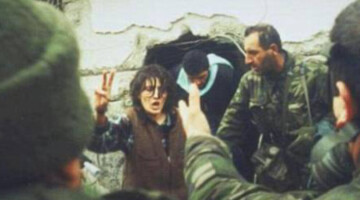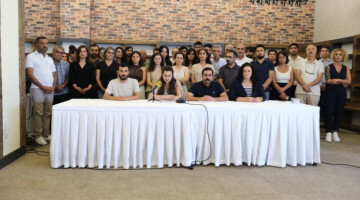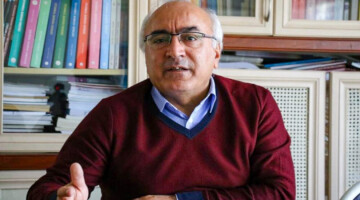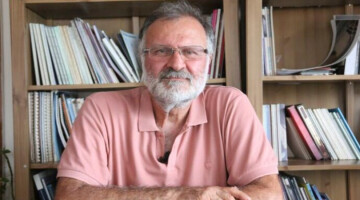The Swiss Kurdish Human Rights Association organized a two-day panel on “Kurdish Leader Abdullah Öcalan and the situation of political prisoners.”
On the first day, a presentation was made to members of the press at the Press Club in Geneva, Switzerland. Tomorrow, another presentation will be made to lawmakers in the Swiss Federal Parliament.
On the first day of the program, a press conference titled 'The Situation of Political Prisoners in Turkey' was held at the Geneva Press Club in Geneva. Rezan Sarıca, one of the lawyers of the Asrın Law Office and a lawyer of Öcalan, Renkin Ergül, one of the lawyers of the Libertarian Lawyers’ Association, and Gianfranco Fattorini, the UN Permanent Representative from the American Association of Jurists attended the conference.
Fattorini spoke first at the press conference in a brief speech and stated that they would discuss the situation in Turkey with the lawyer of Öcalan who remains under strict isolation in İmralı Island Prison.
"There are many cases of suspicious deaths in Turkey's prisons. Some of the prisoners suffer from serious health issues such as cancer, which lead to deaths every year due to lack of access to health services. According to the data gathered by the Human Rights Association, Libertarian Lawyers’ Association and Prisoners' Families Association, there are a total of 1605 sick political prisoners in Turkey, 604 of whom are seriously ill," lawyer Sarıca said.
IMRALI ISOLATION
After explaining the process of the international conspiracy against Öcalan, Sarıca addressed the isolation in Imrali prison where Öcalan has been held since his forced departure to Turkey in 1999.
"While inmates can stay in large groups and remain in contact with one another in all other prisons, Öcalan has been kept under absolute isolation in Imrali for ten years. In all other prisons, inmates have access to means of communication through newspaper, radio, and TV, while Öcalan was denied the right to watch TV and read newspapers for 14 years, and the radio was restricted to one channel (the official state channel TRT-1). Most of his letters were either not delivered or were censored. He was allowed to have a phone call with his brother only twice within 23 years, in 2020 and 2021, for extraordinary reasons.
While prisoner-lawyer meetings can be held confidentially during weekdays in other prisons, lawyer visitations at İmralı were restricted to one hour per week. The principle of confidentiality during lawyer-client meetings was disregarded and all meetings were monitored and recorded. However, even this limited right has never been regularly respected. Lawyers and family visits were constantly prevented.
Statistical information on visits in 11 years reveals the seriousness of the situation. Despite the fact that more than a thousand official applications for a visit have been submitted in 11 years, from July 27, 2011 until today, only 5 lawyer meetings were allowed. However, these meetings took place within a short period of time from May 2 to August 7 in 2019, following the public backlash amid the massive hunger strike protests. Only 5 family meetings were allowed from October 6, 2014 to the present. The last lawyer visitation took place on August 7, 2019 and the last face-to-face family meeting was held on March 3, 2020.
Although 5 new prisoners were transferred to Imrali prison on November 17, 2009, they were kept in separate cells. Their meetings with Öcalan were allowed only for 4-5 hours a week. The length of cell stay was 168 hours and it continued for 164 hours per week. The new prisoners did not change the İmralı system, they were just included in this system.
Because of the dialogue and negotiations on the Kurdish question between 2013 and 2015, the 5 prisoners staying with Öcalan were transferred to other prisons. They were replaced by 5 new prisoners who were designated as 'secretariat for the resolution process'. However, 9 months later, two of them were taken from the island prison against their will. Currently, only Öcalan and three other inmates are staying in the island prison.
These 3 prisoners who were brought to the island in March 2015 were allowed to meet their families only 3 times in 7 years. Also, they have never been allowed to meet their lawyers.
Furthermore, lawyer visits that were already denied arbitrarily, have recently been prevented by unlawful court decisions since 2016, and family visits have been banned by unlawful disciplinary board decisions since September 2018.
REACTION TO INTERNATIONAL INSTITUTIONS
Sarıca emphasized that the international community and legal institutions have not fulfilled their duties properly.
"In its Öcalan No: 2 ruling of March 18, 2014, the ECtHR described the conditions of detention in İmralı Prison between February 16, 1999 and November 17, 2009 as a violation of the prohibition of torture and ill-treatment. The court also ruled that the aggravated life imprisonment was a violation of the prohibition of torture and should be amended. Even though eight years have passed since the ruling, the Turkish government has not introduced any changes regarding imprisonment for life. The government has not presented a legal plan, which is a political and legal obligation, for making changes, including a declaration of intention.
Even though an application was submitted to the ECtHR against lawyer bans in 2011, the ECtHR requested a response from the government in 2019 and kept this urgent application pending for eight years. During those eight years, Imrali Prison was completely closed to lawyer visits. Although 11 years have passed since this application, dated 2011, the ECtHR has not announced a decision.
The European Committee for the Prevention of Torture (CPT) adopted a similar attitude. In its reports, the committee made sharp observations describing the conditions of isolation and ill-treatment at Imrali. However, it chose not to urge effective visits, inspections and procedural activities that would force the government to change its attitude. The findings in the CPT reports reflect an attitude that encourages the government to maintain its current isolation practice.
The last phone call with Öcalan on March 25, 2021 lasted only a few minutes, and we have received no news from him since. All our weekly applications to the prosecutor’s office, the prison administration, the courts, the ministry and the Constitutional Court have all remained inconclusive. Moreover, no results have been obtained either from the applications submitted to different institutions, such as the Parliamentary Human Rights Investigation Commission, the Ombudsman, the Union of Bar Associations and the Medical Association."
Lawyer Sarıca called on rights organizations to fulfil their responsibilities concerning Öcalan.
"Following the declaration of the State of Emergency (OHAL) in Turkey in 2016, the first measure was introduced in İmralı Prison on July 21, 2016, one day before the first statutory decree was issued and entered into force. Family and lawyer visits and all means of communication and contact with the outside world have been banned during the state of emergency," he concluded.













